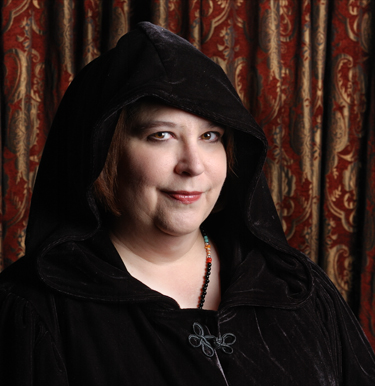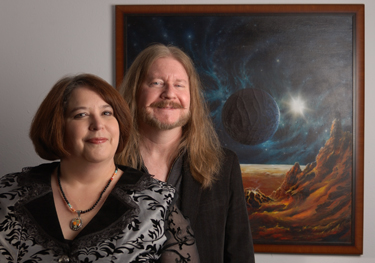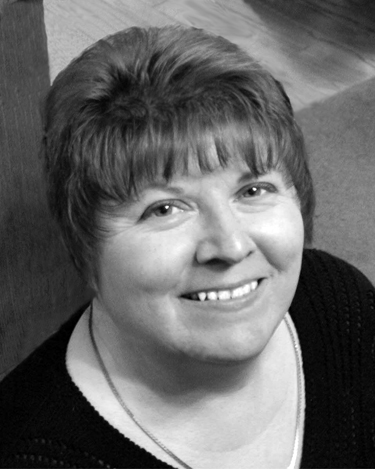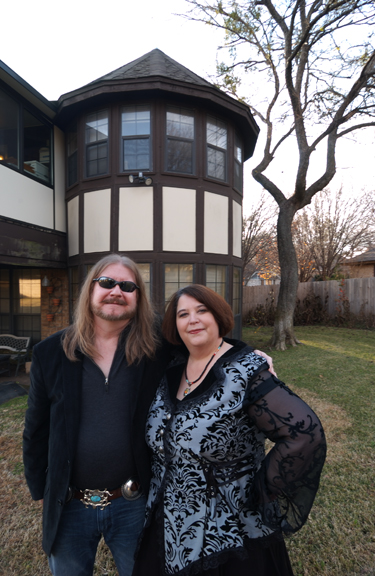A former literary agent of Fort Worth novelist Roxanne Longstreet Conrad’s once told her: “You’re the kind of writer who pokes along doing OK until something you write hits big, and then you go right up there.”
Turns out the man was a prophet, but it took longer than anyone expected for Conrad to “hit it big” and “go right up there” as a published author. She spent years supporting herself with a series of mundane office jobs and evening gigs as a clarinet player, rising early every morning to churn out hard-to-classify novels about vampires, reincarnated dogs, spontaneous combustion, and paranormal romance. She sold them in fits and starts to different publishing houses under at least five different pen names — often learning that her books were selling poorly only when a publisher called to cancel her contract.
 Even if Conrad’s confidence in her abilities as a novelist sometimes faltered, her faith in the kind of stories she wanted to write never flagged. “I’ve always been interested in reading and writing adventure stories,” she said. “That’s what excites me.” Eventually, she found limited success with a group of adult-audience urban fantasy books known as the Weather Warden series, about secret agents who can control the weather.
Even if Conrad’s confidence in her abilities as a novelist sometimes faltered, her faith in the kind of stories she wanted to write never flagged. “I’ve always been interested in reading and writing adventure stories,” she said. “That’s what excites me.” Eventually, she found limited success with a group of adult-audience urban fantasy books known as the Weather Warden series, about secret agents who can control the weather.
However, the adventure stories that brought commercial gold and worldwide fandom to Conrad turned out to be young- adult vampire fiction — think Twilight for the college set — written under the name Rachel Caine. Her Morganville Vampire novels, about vampires and humans struggling to coexist in a small West Texas college town, have taken her to The New York Times and USA Today bestseller lists and have been published in multiple languages. A British company has optioned the Morganville books for possible movie, TV, and video game versions. In April, 18 years after her first book was published, she was finally able to quit her day job in Plano to write full time.
One of her closest friends is Pat Elrod, a prolific urban fantasy author from Fort Worth who writes the popular Vampire Files novels under the name P.N. Elrod. The two have known each other for almost 20 years — they practically grew up together as published authors.
“There are a lot of good writers who deserve success, and somehow it just slips around them,” said Elrod. “For a long time people have heard of Roxanne, but now they’re reading her books.”
Through the victories and defeats, Conrad learned one hard reality about life as a published fiction writer: “I’m not saying writing isn’t profitable,” she said, “but you have to reach a certain level before you can start buying steak from the grocery store.”
Conrad has paid her dues. After many noms de plume, it’s Rachel Caine who is finally putting steak on her table.
 With her dark hair, dark eyes, and round face, Conrad exudes a youthfulness and enthusiasm that’s appropriate for the young adult audience she has earned with the Rachel Caine vampire books. She can giggle like a teenager one minute, then turn around and offer a sharply observed opinion on the very grown-up world of writing and publishing.
With her dark hair, dark eyes, and round face, Conrad exudes a youthfulness and enthusiasm that’s appropriate for the young adult audience she has earned with the Rachel Caine vampire books. She can giggle like a teenager one minute, then turn around and offer a sharply observed opinion on the very grown-up world of writing and publishing.
She was born Roxanne Longstreet 48 years ago at the military base of the White Sands Missile Range in New Mexico. Her dad was a career Army man who, among other things, provided the voice for countdowns during rocket tests in the early ’60s. Her mom worked as a civilian assistant to rocket scientists.
Despite that early background, Roxanne didn’t grow up feeling pressured to study science. Her parents did instill in her a deep love of reading. Her father enjoyed sci-fi and fantasy, while her mother adored mysteries and romance novels. When he retired from the military in 1975, the family moved to El Paso. Conrad’s father would drive his daughter to different used bookstores, and they’d buy paperbacks by the bagful. Two of Conrad’s biggest early influences were the fantasy writer Roger Zelazny, whose Chronicles of Amber novels explore alternate dimensions of reality and family identity (“I read those books dozens of times”), and, of course, Stephen King. His early vampire novel Salem’s Lot particularly fired her imagination.
“That book scared the holy crap out of me,” she said. “We lived in the country, and I had a nice big bay window in my bedroom, so you can imagine … .” (King’s vampires tend to tap on their victims’ windows at night.)
Conrad wrote her first short story at 14. It was a variation on what would now be called “fan fiction” — she basically re-imagined an episode of the TV series Space 1999. From that point, her fiction output remained prodigious. She gave many of the stories away as gifts to family and friends — as a teenager and young adult, it never occurred to her that she might become a novelist. Back then, her heart was in music.
She began studying clarinet in junior high school, and by the time she was attending college as a business major at Texas Tech University in the early ’80s, she was playing part time with the Lubbock Symphony Orchestra. For five years after college she performed with various symphonies around the state, working office jobs and aiming for a full-time orchestral music career. She moved to Fort Worth in 1987.
The whole time, Conrad continued to write fiction for her own pleasure. At that point, she was into epic, Tolkienesque fantasy tales that she occasionally sent off to magazines, but nothing got accepted. The manner of the rejections was notable, however.
“I didn’t realize that handwritten rejection letters were a good sign,” she said. “These lovely editors were taking the time to write out their thoughts about my work.”
Then in 1990, a friend who was sick of Conrad keeping her fiction to herself bought her a ticket to an area sci-fi convention that included a small writers’ conference. She met a video game industry representative who asked her to send him some work. She did, and he got Conrad her first book deal — a tie-in novel for a fantasy role-playing game called Stormriders. It was published under the pen name “Ian Hammel,” because, presumably, fanboys wouldn’t buy books with a chick’s name on them. She was elated, but the thrill soon subsided.
“At the time, I was uninformed about everything in the publishing business,” she said. “I didn’t get to keep the rights to the book, the game company did. That kind of deal wasn’t considered reputable in the [publishing] industry. An agent told me, ‘You need to start all over again.’ ”
Her education in the mercurial, sales-driven world of genre fiction was just beginning.
 Conrad did start over, with a 1992 vampire novel called The Undead for Kensington, a New York publishing house that specializes in fantasy, romance, and crime thrillers. She got married that year as well, to fantasy illustrator R. Cat Conrad, whom she’d met at a sci-fi convention. But for her first book she kept her birth name.
Conrad did start over, with a 1992 vampire novel called The Undead for Kensington, a New York publishing house that specializes in fantasy, romance, and crime thrillers. She got married that year as well, to fantasy illustrator R. Cat Conrad, whom she’d met at a sci-fi convention. But for her first book she kept her birth name.
The same year she decided that working a day job, playing the clarinet in orchestras at night, and churning out novels in the early morning was too much. “I decided I was as good as I would ever get as a clarinet player, so I quit the music and focused on writing,” she said.
Around that time she met Elrod at the Dallas Fantasy Fair. They both joined a sci-fi fan clique known as ORAC (Organized Rebel Adventurers Club). Elrod, who to date has 23 published books including the Vampire Files series, had recently had her first novel released, and Conrad liked it.
“I initially sort of blew her off,” Elrod said, laughing. “I’m kind of hard to get to know. But she was persistent, and we became friends. I soon realized she was a scary-smart individual. I came to admire her brain.”
The Undead sold reasonably well, though not well enough for Conrad to quit her office job. She wound up publishing five more fantasy/horror titles with Kensington, two of them vampire-related. Her last novel for the company was called Slow Burn; it was a dark urban fantasia about a group of hookers, professional thieves, and dry-cleaner owners who conspire to cause people to spontaneously combust. (“They didn’t know what to do with it, and I don’t blame them,” she said.) Sales had fallen, and in 1996 Kensington released her and wished her luck.
Her agent got her a deal with Penguin, and she began writing titles for their Signet paperback imprint, which had published Stephen King’s early novels in the 1970s. But they didn’t want to use the name “Roxanne Longstreet” because sales had been poor with that handle. She was happy to be reintroduced into the market as Roxanne Conrad.
 Penguin decided to market her hard-to-classify fantasy books as “romantic suspense” because they sometimes featured romance as a subplot. Traditional bodice rippers, they weren’t — 1997’s Copper Moon revolved around the reincarnation of dogs. And 1998’s Bridge of Shadows may have had a big pink flower on the cover, but it opened with a mother and child being smuggled across a border in the trunk of a car. After two titles, Penguin said, we love ya, Roxanne, but your books aren’t selling, and she got another breakup letter from another publisher. She was deeply discouraged.
Penguin decided to market her hard-to-classify fantasy books as “romantic suspense” because they sometimes featured romance as a subplot. Traditional bodice rippers, they weren’t — 1997’s Copper Moon revolved around the reincarnation of dogs. And 1998’s Bridge of Shadows may have had a big pink flower on the cover, but it opened with a mother and child being smuggled across a border in the trunk of a car. After two titles, Penguin said, we love ya, Roxanne, but your books aren’t selling, and she got another breakup letter from another publisher. She was deeply discouraged.
“In 2000 I announced to my family and friends that I would quit writing,” she said. “Nobody believed me, of course, because I’d always written, and they knew how obsessed I was with it.”
Family and friends were right. “She said she was going to quit and focus on real-life stuff like being a wife and working at her day job,” Elrod remembered. “I said, ‘No, you’re not.’ She has the fire in her. No one with that much talent just walks away from it.”
In 2001 Conrad switched agents and wrote a proposal for a series of novels about a cabal of international agents who can control the elements and thereby ward off natural disasters. Her new agent convinced Penguin to sign her to a three-book contract, and the first volume of the Weather Warden series debuted in 2003.
The Penguin suits decided that the name “Roxanne Conrad” was urban fantasy poison, so they asked her to change it. Again.
This time, she picked the first name of a college friend, Rachel. “I was going to pick an exotic last name, then they told me, ‘We have other authors with last names that start with ‘b’ and ‘c’ and they’re selling well. If you pick a last name that starts with one of those, we can keep them all together on the shelf.’ I picked Caine.”
As inane as such a commercial gambit might sound, the Weather Warden series by Rachel Caine became her best-selling books up to that date. Penguin was impressed enough to approach Conrad to try her hand at young adult fiction when the company started its imprint for teens in 2005. That’s when the vampires came calling at her window again.
Conrad’s initial reaction to writing for teens and twentysomethings was: I’m too old to connect with that audience. I don’t know what they’re interested in. Her editor, who has since left Penguin, told her that the Weather Warden books were practically young adult material. (“I didn’t know if that was a compliment at first,” she said.) Young readers were looking for stories with strong characters and compelling plots like everyone else, she said. The main restrictions were against explicit sex and language, but in writing for adults Conrad didn’t rely much on those, anyway.
Anne Sowards has been Conrad’s editor at Penguin since 2007. She’s worked with the author on most of the Morganville novels as well as some of the later Weather Warden books. In the last few years, she said, there has been a small influx of adult fiction authors trying their hand at young adult books.
“With the success of authors like Stephenie Meyer and Suzanne Collins, publishers realized that adults as well as teens are buying YA novels,” she said. Besides those writers of, respectively, the Twilight and Hunger Games books, “established authors from James Patterson to Kelley Armstrong to Carl Hiassen to Isabelle Allende are now writing YA as well as adult fiction to reach a new market,” the editor said.
The transition from an older to a younger audience wasn’t as difficult as Conrad initially feared. The key, she realized, was “to write in a strong and lucid style that connects with the reader. By that, I mean you filter the story through the characters’ viewpoints and not a literary style. If you’re writing about a 16-year-old girl, you stay in the moment and respect that character’s experiences, whether it’s boiling spaghetti for the first time or encountering your first bad boyfriend.”
Meyer had just published the first book in her teen vampire romance series in 2005, and her original Penguin editor advised Conrad to check it out. She enjoyed it and, of course, had been fascinated by vampires since she encountered Salem’s Lot as a kid, but she didn’t think there was anything new to contribute to that vast field. She was stuck.
Again, it was a friend who gave her a much-needed push. Knowing Conrad’s fast and fertile mind, the friend bet her that, if they took a car ride, before the ride was over the author would come up with some ideas for a young-adult vampire novel. They drove around and began free-associating about bloodsuckers. At one point when they were at a traffic light, Conrad said, “If vampires were planning a town, they’d place the street lights far apart,” so that potential victims would be more often in the vampire-friendly darkness. It was her first thought on what a community planned by the undead might look like.
 With the car ride over, Conrad wrote a proposal for the book series that would become The Morganville Vampires. The first book, Glass Houses, was released by Penguin in 2006. Set in a fictional West Texas college town created and secretly run by vampires, the books star a brainy female (non-vampire) student at Texas Prairie University named Claire Danvers. Like many college kids, she has dorm hall friends and enemies, a boyfriend, even a favorite coffeeshop. But Claire must also contend with vampires, ghosts, a house with a mind of its own, machines that erase memory, and alternate dimensions of reality.
With the car ride over, Conrad wrote a proposal for the book series that would become The Morganville Vampires. The first book, Glass Houses, was released by Penguin in 2006. Set in a fictional West Texas college town created and secretly run by vampires, the books star a brainy female (non-vampire) student at Texas Prairie University named Claire Danvers. Like many college kids, she has dorm hall friends and enemies, a boyfriend, even a favorite coffeeshop. But Claire must also contend with vampires, ghosts, a house with a mind of its own, machines that erase memory, and alternate dimensions of reality.
Conrad could’ve set the Morganville novels almost anywhere, but there was something about her experiences in Texas that led her to place them here.
“After high school I was offered a bunch of different scholarships to Texas universities,” she said. “I’d travel to these small quirky towns and think, ‘Why would anyone want to come here?’ And I wound up in Lubbock, right? I thought it would be interesting to have Claire be a newcomer to an isolated Texas town, and the only reason she’d ever live there was to go to college.”
Turns out vampires who rule Texas college towns were a good bet: Conrad published her ninth Morganville Vampires book, titled Ghost Town, last October. Two of the titles have made it to The New York Times and USA Today young adult fiction bestseller list. Sowards declined to comment on sales figures, but the author said that several of the books are on their sixth printing, and those have sold at least 50,000 copies each. Already popular in the U.K., the novels are about to be published in Australia, New Zealand, France, Italy, and Brazil.
Since the ’90s Conrad has been visiting several sci-fi/fantasy conventions a year on her own dime to sign books, but the success of the Morganville novels has earned her publisher-sponsored international signing tours. Ghost Town brought her to 12 U.S. cities in 12 days. Last summer she traveled to the U.K. and made 40 stops in 28 days. Between 50 and 150 fans might show up looking for autographs and the chance to chat her up about their favorite Morganville characters.
Sowards said it’s not hard to explain why young readers around the world have latched onto the Morganville titles.
“Roxanne has always had a great feel for the teen voice,” she said. “Claire Danvers is appealing and completely relatable. The books are action-packed but have moments of great emotion.”
In one review, a critic for the Library School Journal wrote: “Readers will fall under Caine’s spell as she weaves together scary moments with romantic situations. Those looking for books like Twilight, but with more bite, will enjoy this series.” The prestigious British sci-fi/fantasy mag SFX — not known for pulling its punches — wrote of the Morganville novels: “We’d suggest dumping Stephenie Meyer’s vapid Twilight books and replacing them with these.”
Some fan reactions have been deeply personal. One 21-year-old woman e-mailed Conrad to tell her she’d managed to get through high school and college without finishing a single book, relying instead on Cliffs Notes and summaries. One day she was stuck in her apartment with nothing to do. She had a library copy of one of the Morganville books because a friend had told her she would love it. She finished it in record time and wanted a reading list from Conrad of some of her favorite books.
Another time, a teacher told Conrad that a troubled student had learned to love reading via the Morganville series, and her grades had improved dramatically.
“Those kinds of stories are specific to the young adult market,” Conrad said, “and you really know you’ve made a difference when you hear them.”
Elrod isn’t surprised that Conrad found her first big success as a writer of young adult fiction. But in her mind, Conrad’s talent makes categories irrelevant.
“To me, a book is a book is a book,” she said. “If it’s well-written, it’ll transcend the slot it’s been placed in. If Roxanne decided to write books on the mating habits of the greater North American rattlesnake, she’d excel at it.”
Last April Conrad quit her day job as director of corporate communications for LSG Sky Chefs in Plano and now writes full time, from an office in the turret of the mock Tudor home in Fort Worth that she shares with her husband. She gets up early in the morning and writes until mid-afternoon. Her husband also works from home, but the pair mostly avoid commenting on each other’s work.
“Nobody wants to live with a critic,” the author said.
Her work ethic is as feverish as ever. She has three more books to go to fulfill her Morganville contract. The third novel in her series known as Outcast Season, a spin-off of the completed Weather Warden series, is about to be published. And this summer the first in a new adult series called Revivalist, about a funeral home that re–animates dead people for fun and profit, will hit the shelves.
“Every time I update my bio, it surprises me how many books I’ve written,” she said. “That’s a lot of words and pages and trees. But I take breaks to give myself a breather.”
Some of those breaks include Sunday afternoons eating pizza and watching Dr. Who videos with Elrod. “We don’t talk shop,” Elrod said.
Perhaps the biggest news on the Morganville Vampires front is that a British production company called Noel Gay Motion Pictures, best known internationally for developing the Red Dwarf TV series, has bought the multimedia rights to Conrad’s Texas vampires. She has no idea what stage of development any Morganville TV or movie project is in, but she’s keeping her fingers crossed.
Which begs the question: If Conrad becomes even more internationally successful as an author of teen vampire fiction, will it forever hinder her ability to get something more literary published? Somewhere inside, is she burning to earn “serious” respect along the lines of, say, current critical golden boy
Jonathan Franzen?
“I’ve never learned the trick of writing in that ‘literary’ style,” Conrad said. “I’ve always loved adventure stories. But it’s funny, because some of the great classics of literature have been adventure and romance stories. I don’t understand why it’s more legitimate to write about visiting Italy than, say, visiting Mars. I’ll be happy if my obituary says I’m an author of respected potboilers.”











